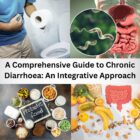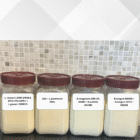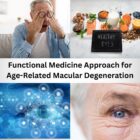Functional Medicine Approach for Age-Related Macular Degeneration
Age-related Macular Degeneration (AMD) is the leading cause of blindness in developed countries, particularly affecting older adults. AMD primarily targets the macula, the part of the retina responsible for central vision, which is essential for tasks like reading and driving. There are two types of AMD: dry AMD and wet AMD. As the aging population increases, addressing AMD through early prevention, dietary changes, and targeted supplementation has become essential in preserving vision and improving quality of life. In this blog, we will look at a holistic functional medicine approach to managing age-related macular degeneration.
What is Age-Related Macular Degeneration?
Age-related Macular Degeneration (AMD) is a leading cause of vision loss, especially in older adults. There are two main types:
- Dry AMD: This type progresses slowly over decades. It’s characterized by the degeneration of retinal pigment epithelial cells, causing gradual loss of central vision. While it’s less severe initially, it eventually leads to significant visual impairment.
- Wet AMD: This form progresses rapidly, often within months. It involves the growth of abnormal blood vessels under the retina, leading to leakage, edema, and hemorrhages. Wet AMD results in faster and more severe vision loss compared to dry AMD, making early intervention critical.
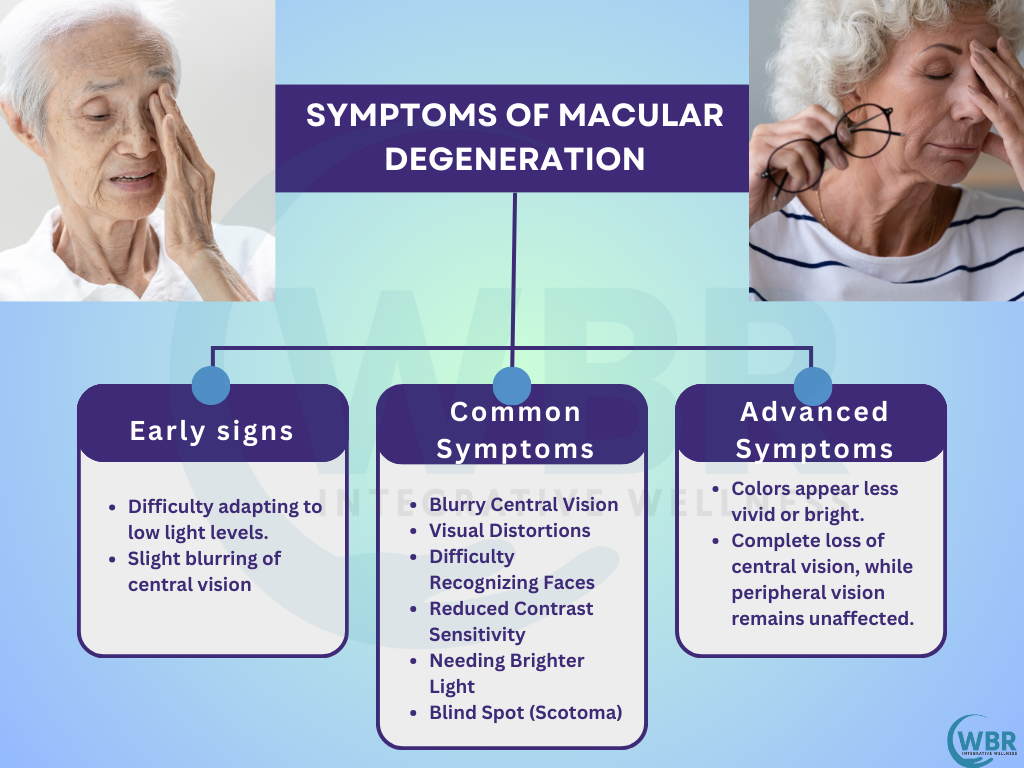
The Functional Medicine Approach for Age-Related Macular Degeneration
The functional medicine approach to Age-Related Macular Degeneration (AMD) emphasizes addressing the root causes of the condition, such as oxidative stress, nutritional deficiencies, and genetic factors. Rather than merely managing symptoms, this holistic approach aims to restore balance through personalized care. By focusing on diet, targeted supplements, and lifestyle modifications, functional medicine helps reduce inflammation, improve retinal health, and slow the progression of AMD. This tailored strategy enhances overall well-being and supports eye health in a more comprehensive, individualized manner. Let’s understand in depth how a functional medicine approach helps in managing AMD.
The Role of Oxidative Stress in Age-Related Macular Degeneration
Oxidative stress plays a central role in the development of Age-Related Macular Degeneration (AMD). Over time, the retina accumulates lipofuscin, a byproduct of cellular metabolism that can hinder proper retinal function. Exposure to UV light and oxygen also leads to the production of free radicals, which damage retinal cells. This oxidative damage accelerates the degeneration of the retinal pigment epithelium (RPE) and photoreceptors, crucial cells for vision. As the damage accumulates, it contributes to the gradual loss of sight in AMD, highlighting the importance of combating oxidative stress to preserve eye health and prevent progression.
Genetics and Environmental Risk Factors for AMD
Genetic predisposition plays a significant role in the development of age-related macular degeneration (AMD). Variants in genes like CFH and ARMS2 can increase susceptibility to the condition. However, lifestyle factors also contribute to risk. A diet high in antioxidants, and omega-3 fatty acids, and low in processed foods reduces AMD progression. Smoking is a major risk factor, as it accelerates damage to retinal cells. Excessive sun exposure often leads to oxidative stress, further harming the retina. Adopting a functional medicine approach, which emphasizes personalized care, nutrition, and lifestyle changes, helps manage AMD and slow its progression.
Dietary Factors in Age-Related Macular Degeneration Prevention
A functional medicine approach emphasizes the role of diet in managing and preventing AMD. Here are key dietary factors to consider:
- Fats: High intake of total fat, saturated fat, and cholesterol increases AMD risk. However, fish rich in omega-3 fatty acids offer protective benefits for retinal health.
- Linoleic Acid: Vegetable oils high in linoleic acid contribute to oxidative stress, which harms retinal cells and may worsen AMD.
A balanced, nutrient-rich diet plays a key role in AMD prevention.
Nutritional Supplements for Age-related Macular Degeneration
As we age, nutritional deficiencies increase, making the eyes more vulnerable to conditions like Age-related macular degeneration. Supplementing with key nutrients helps protect and support retinal health. Key nutrients include:
- Zinc: Crucial for retinal function and slows AMD progression.
- Taurine: An amino acid that supports retinal health by protecting against oxidative damage.
- Antioxidants: Vitamins C and E, as well as other antioxidants, help neutralize free radicals and reduce oxidative stress.
- Carotenoids (Lutein & Zeaxanthin): Found in leafy greens, these nutrients filter harmful blue light and support macular health.
- Omega-3 Fatty Acids, Acetyl-L-Carnitine, Coenzyme Q10: Combination improves vision and reduces drusen in early AMD.
- Anthocyanosides: Found in bilberries, they boost retinal health and capillary integrity, though they have not yet been studied for AMD.
- Quercetin: Antioxidant that protects retinal cells from oxidative damage.
- Glutathione: Intravenous treatment shows vision improvement in AMD.
- Melatonin: Antioxidant that reduces retinal damage; beneficial for dry and wet AMD.
- Ginkgo Biloba: Enhances blood flow and visual acuity.
- DHEA: May address AMD-related aging symptoms in low DHEA levels
A targeted supplement regimen is an effective part of a functional medicine approach to managing AMD.
Lutein and Zeaxanthin: Key Nutrients for Age-Related Macular Degeneration
Lutein and zeaxanthin are carotenoids found in high concentrations in the macula, where they play a protective role. Here’s how they help:
- What They Are: Carotenoids that accumulate in the macula, acting as natural protectors against harmful blue light.
- How They Help: These nutrients filter blue light and shield retinal photoreceptors from oxidative damage.
- Research: Clinical studies show that supplementation increases macular pigment optical density, which improves vision and slows AMD progression.
- Sources: Enjoy foods like spinach, kale, egg yolks, corn, and squash to support AMD management and eye health.
Including lutein and zeaxanthin in your diet can make a significant difference in AMD prevention and management.
The Power of Zinc in AMD
Zinc is essential for retinal function and acts as a powerful antioxidant. Here’s why it matters for AMD:
- Vital Role: Zinc supports the health of retinal cells and helps maintain the integrity of the retina.
- Antioxidant Properties: It neutralizes harmful free radicals, protecting the eyes from oxidative stress.
- Studies: Research shows that zinc supplementation slows the progression of AMD, particularly in individuals with early-stage AMD.
- Food Sources: Zinc-rich foods include oysters, beans, and nuts.
Incorporating zinc into your diet significantly supports AMD prevention and helps preserve vision.
Additional Nutrients for AMD
Certain nutrients play a crucial role in protecting the retina and supporting overall eye health in AMD. Here are some key nutrients to consider:
- Antioxidants: Vitamins like Vitamin E, along with compounds like bilberry, protect the retina from oxidative damage and help reduce inflammation.
- Taurine: This amino acid supports retinal function by reducing oxidative stress and preserving photoreceptor cells.
- N-acetylcysteine (NAC): NAC helps replenish glutathione, a powerful antioxidant, aiding in the reduction of oxidative stress and supporting retinal health.
Including these nutrients in your diet or supplements enhances AMD management and slows its progression.
Zinc and Copper Balance in AMD
Maintaining the proper balance of zinc and copper is crucial for eye health, especially in AMD management. Here’s how these minerals work together:
- Zinc’s Role: Zinc supports retinal health and enhances antioxidant activity, helping to protect against oxidative damage in the retina.
- Long-Term Studies: Research shows that zinc supplementation slows AMD progression, particularly in the early stages.
- Copper Supplementation: When using high-dose zinc, copper supplementation is essential to prevent copper deficiency, which impairs enzyme function.
- Practical Recommendation: Use a balanced zinc and copper formula as part of an AMD prevention regimen to optimize retinal health.
Ensure you’re supplementing both minerals to avoid imbalances and promote optimal eye function.
Taurine: A Key Nutrient for Retinal Health
Taurine plays a vital role in retinal health. Here’s how it helps:
- Protective Effects: Taurine shields retinal cells, particularly in the photoreceptor layer, from damage.
- Deficiency Links: Low taurine levels are linked to retinal degeneration in both animals and humans.
- Supplementation: Studies suggest 100-500 mg/day of taurine benefits AMD patients by reducing oxidative stress and improving retinal function.
Vitamin E: The Complexities of Supplementation
Vitamin E plays a key antioxidant role in AMD management, but supplementation outcomes vary:
- Antioxidant Role: Vitamin E helps neutralize free radicals, protecting retinal cells.
- Study Discrepancies: Observational studies show benefits, but trials with alpha-tocopherol alone show limited impact.
- Gamma-Tocopherol: Found in foods, it offers better protection by scavenging reactive nitrogen oxide.
- Recommendation: Use mixed tocopherols for broader antioxidant protection and potential AMD prevention.
Selenium and Other Antioxidants
Selenium and B vitamins play a crucial role in AMD prevention by reducing oxidative stress and supporting retinal health. Here’s how they help:
- Selenium’s Role: Selenium acts as a powerful antioxidant, preventing oxidative damage in the retina and supporting retinal cell health.
- Low Selenium Levels: Studies show that low selenium levels are associated with an increased risk of early AMD.
- B Vitamins: Vitamins B6, B12, and folic acid help lower homocysteine levels, a known risk factor for AMD.
- Clinical Evidence: Supplementation with B vitamins has shown a significant reduction in AMD risk.
Recommendation: Incorporate selenium and B vitamins as part of a comprehensive AMD prevention strategy.
Omega-3 Fatty Acids for AMD Protection:
Omega-3 fatty acids, especially DHA, are essential for retinal health and visual function. Here’s how they help:
- Role of DHA: DHA, a key omega-3 fatty acid, supports retinal cell structure and function, promoting overall eye health.
- Fish Oil Intake: Observational studies suggest that higher fish oil intake is linked to a lower risk of developing AMD.
- Intervention Studies: Research shows that omega-3 supplementation improves macular pigment density and visual acuity in individuals with AMD.
Recommendation: Include omega-3-rich foods or supplements in your diet to support AMD prevention and retinal health.
Combination Nutrient Therapy:
Combining specific nutrients offers a more effective strategy to slow AMD progression. Here’s how it works:
- Benefits of Combination Therapy: Combining nutrients like zinc, vitamin E, taurine, and vitamin C enhances antioxidant protection and retinal health.
- Study Examples: Research shows that nutrients like zinc and vitamin E when used together, slow AMD progression and protect against oxidative damage.
- Study Results: Clinical studies demonstrate that nutrient combinations have significantly slowed AMD progression in patients, improving visual outcomes.
- Caution on Supplement Forms: Be cautious about supplement forms (e.g., alpha-tocopherol vs. mixed tocopherols) for optimal effectiveness.
Recommendation: Opt for a balanced combination of antioxidants and minerals, such as mixed tocopherols, to support AMD prevention.
Lifestyle Factors and Age-related Macular Degeneration
Adopting a healthy lifestyle is key to managing and preventing AMD. Here’s how lifestyle factors play a role:
- Dietary Habits: Focus on a nutrient-rich diet with dark leafy greens, colorful fruits, and healthy fats to support retinal health.
- Exercise: Regular physical activity improves circulation, reduces inflammation, and slows AMD progression by promoting overall health.
- Sun Protection: Wearing sunglasses and hats reduces UV light exposure, preventing further damage to retinal cells and minimizing oxidative stress.
Incorporating these habits into your daily routine supports eye health and protect against AMD.
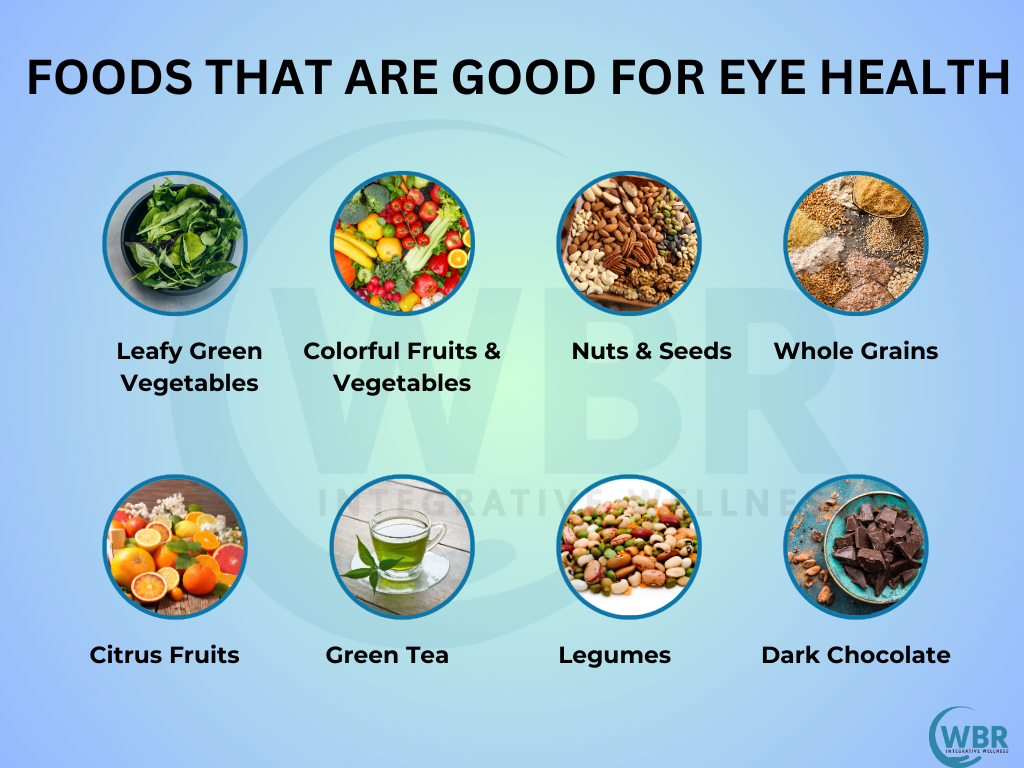
Other Emerging Treatments
Combining specific nutrients is a powerful strategy to slow the progression of AMD. Here’s how it works:
- Benefits of Combination Therapy: Nutrients like zinc, vitamin E, taurine, and vitamin C work synergistically to enhance antioxidant protection and support retinal health.
- Study Examples: Research indicates that the combination of zinc and vitamin E can help slow AMD progression and protect against oxidative damage.
- Study Results: Clinical studies show that nutrient combinations significantly reduce AMD progression and improve visual outcomes in patients.
- Caution on Supplement Forms: Be mindful of supplement forms (e.g., alpha-tocopherol vs. mixed tocopherols) for optimal effectiveness.
Recommendation: Opt for a balanced combination of antioxidants and minerals, such as mixed tocopherols, to effectively support AMD prevention.
Conclusion
Incorporating a functional medicine approach to managing age-related macular degeneration (AMD) offers a holistic strategy to protect and support retinal health. By focusing on a nutrient-rich diet, targeted supplements, and lifestyle adjustments, you can slow AMD progression and potentially improve vision. Key nutrients like lutein, zinc, taurine, and omega-3 fatty acids work together to combat oxidative stress and support retinal function. Combining these nutrients with regular exercise, sun protection, and healthy habits creates a powerful defense against AMD. Taking proactive steps today can help preserve your vision for years to come, empowering you to age gracefully with healthy eyes.
References
- https://pmc.ncbi.nlm.nih.gov/articles/PMC5712933/
- https://www.sciencedirect.com/topics/neuroscience/age-related-macular-degeneration
- https://www.tandfonline.com/doi/full/10.1080/07853890600946724
- https://pubmed.ncbi.nlm.nih.gov/16399908/
- https://pubmed.ncbi.nlm.nih.gov/16380590/
- https://pmc.ncbi.nlm.nih.gov/articles/PMC11050487/
- https://pubmed.ncbi.nlm.nih.gov/3277606/



